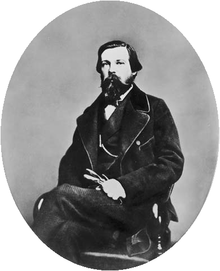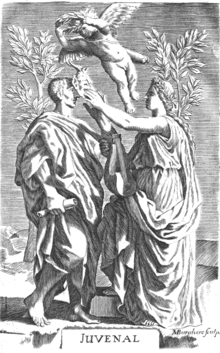Selling out





Selling out is the compromising of integrity, morality, authenticity, or principles in exchange for personal gain, such as money. In terms of music or art, selling out is associated with attempts to tailor material to a mainstream or commercial audience; for example, a musician who alters his material to encompass a wider audience, and in turn generate greater revenue, may be labeled by fans who pre-date the change as a sellout.
A
[edit]- Plato said that virtue has no master [Republic 617e]. If a person does not honor this principle and rejoice in it, but is purchasable for money, he creates many masters for himself.
- Apollonius of Tyana, letter to Euphrates, Epp. Apoll. 15
- All paid jobs … absorb and degrade the mind.
- Aristotle, Politics 1337b14, B. Jowett, trans., in The Basic Works of Aristotle (1941), p. 1306
- During those years I taught the art of rhetoric. Conquered by the desire for gain, I offered for sale speaking skills with which to conquer others.
- Augustine, Confessions, Book 4, Chapter 1
B
[edit]- It is a strange desire which men have, to seek power and lose liberty.
C
[edit]- Whoever gives his labor for money sells himself and puts himself in the rank of slaves.
- Cicero, On Duties, 1:42
D
[edit]- Robert G. Ingersoll and Wendell Phillips were the two greatest orators of their time, and probably of all time. Their power sprang from their passion for freedom, for truth, for justice, for a world filled with light and with happy human beings. But for this divine passion neither would have scaled the sublime heights of immortal achievement. The sacred fire burned within them and when they were aroused it flashed from their eyes and rolled from their inspired lips in torrents of eloquence. ... Had Ingersoll and Phillips devoted their lives to the practice of law for pay the divine fire within them would have burned to ashes and they would have died in mediocrity.
- Eugene Debs, "The Secret of Efficient Expression" (1911)
- I was not, thank heaven, in a condition which compelled me to make merchandise of Science for the bettering of my fortune.
- René Descartes, Discourse on Method, J. Veitch, trans. (1899), part 1, p. 8
E
[edit]- The only difference as compared with the old, outspoken slavery is this, that the worker of today seems to be free because he is not sold once for all, but piecemeal by the day, the week, the year, and because no one owner sells him to another, but he is forced to sell himself in this way instead, being the slave of no particular person, but of the whole property-holding class.
G
[edit]- Those who are placed in positions which demand the surrender of personality, which insist on strict conformity to definite political policies and opinions, must deteriorate, must become mechanical, must lose all capacity to give anything really vital. The world is full of such unfortunate cripples. Their dream is to “arrive,” no matter at what cost. If only we would stop to consider what it means to “arrive,” we would pity the unfortunate victim. Instead of that, we look to the artist, the poet, the writer, the dramatist and thinker who have “arrived,” as the final authority on all matters, whereas in reality their “arrival” is synonymous with mediocrity, with the denial and betrayal of what might in the beginning have meant something real and ideal. The “arrived” artists are dead souls upon the intellectual horizon. The uncompromising and daring spirits never “arrive.” Their life represents an endless battle with the stupidity and the dullness of their time. They must remain what Nietzsche calls “untimely,” because everything that strives for new form, new expression or new values, is always doomed to be untimely.
- Emma Goldman, "Intellectual Proletarians" (1914)
- Más preciosa es la libertad que la dádiva, porque se pierde.
- Freedom is more precious then the gift that makes us lose it.
- Baltasar Gracián, Oráculo Manual y Arte de Prudencia, § 286 (Christopher Maurer trans.)
- Freedom is more precious then the gift that makes us lose it.
- Ein Mensch, der um anderer willen, ohne dass es seine eigene Leidenschaft, sein eigenes Bedürfnis ist, sich um Geld oder Ehre oder sonst etwas abarbeitet, ist immer ein Tor.
- A man who works at another’s will, not for his own passion or his own need, but for money or honor, is always a fool.
- Johann Wolfgang von Goethe, The Sorrows of Young Werther, p. 46
- A man who works at another’s will, not for his own passion or his own need, but for money or honor, is always a fool.
H
[edit]- The professional man lives off ideas, not for them. ... He has acquired a stock of mental skills that are for sale. The skills are highly developed, but we do not think of him as being an intellectual if certain qualities are missing from his work—disinterested intelligence, generalizing power, free speculation, fresh observation, creative novelty, radical criticism. At home he may happen to be an intellectual, but at his job he is a hired mental technician who uses his mind for the pursuit of externally determined ends. It is this element—the fact that ends are set from some interest or vantage point outside the intellectual process itself—which characterizes both the zealot, who lives obsessively for a single idea, and the mental technician, whose mind is used not for free speculation but for a salable end. The goal here is external and not self-determined, whereas the intellectual life has a certain spontaneous character and inner determination. It has also a peculiar poise of its own, which I believe is established by a balance between two basic qualities in the intellectual’s attitude toward ideas—qualities that may be designated as playfulness and piety.
- Richard Hofstadter, Anti-Intellectualism in American Life (1974), p. 27
J
[edit]- But, scarce observ'd, the knowing and the bold
Fall in the gen'ral massacre of gold.- Samuel Johnson, The Vanity of Human Wishes, 21
- Knaves, who in full assemblies have the knack
- Of turning truth to lies, and white to black,
- Can hire large houses, and oppress the poor
- By farmed excise; can cleanse the common-shore,
- And rent the fishery; can bear the dead,
- And teach their eyes dissembled tears to shed;
- All this for gain; for gain they sell their very head.
- Juvenal, Satire III, John Dryden, trans.
L
[edit]- Men accept servility in order to acquire wealth; as if they could acquire anything of their own when they cannot even assert that they belong to themselves.
- Étienne de la Boétie, Discourse of Voluntary Servitude, Part 3
M
[edit]- An intellectual who accommodates the ruling caste betrays the spirit. For the spirit is not conservative and grants no privileges. It dissolves; it equalizes; and it pushes through the ruins of hundreds of castles toward the final fulfillment of truth and justice, and their completion, even if it is the completion of death.
- Heinrich Mann, “Geist und Tat,” Essays (1960), p. 14, as cited in Russell Berman, Modern Culture and Critical Theory (1989), p. 45
- τί γὰρ ὠφεληθήσεται ἄνθρωπος ἐὰν τὸν κόσμον ὅλον κερδήσῃ, τὴν δὲ ψυχὴν αὐτοῦ ζημιωθῇ;
- What will it profit a man if he gains the whole world, but loses his soul?
- Matthew 16:26 (Berean Literal Bible)
- What will it profit a man if he gains the whole world, but loses his soul?
- Originally I was content to just simply accept the money, that was offered when people had adapted my comic books into films. Eventually I decided to refuse to accept any of the money for the films, and to ask if my name could be taken off of them, so that I no longer had to endure the embarrasment of seeing my work travested in this manner. The first film that they made of my work was "From Hell" Which was an adaptation of my "Jack the Ripper" narrative … In which they replaced my gruff Dorset police constable with Johhny Depp's Absinthe-swigging dandy. The next film to be made from one of my books was the regrettable "League of Extraordinary Gentlemen"… Where the only resemblence it had to my book was a similar title. The most recent film that they have made of mine is apparently this new "V for Vendetta" movie which was probably the final straw between me and Hollywood. They were written to be impossible to reproduce in terms of cinema, and so why not leave them simply as a comic in the way that they were intended to be. And if you are going to make them into films, please try to make them into better ones, than the ones I have been cursed with thus far.
- Alan Moore the BBC2 show The Culture Show (9 March 2006) (separate quotes shown; edited together for the segment of the show)
N
[edit]- Teenage angst has paid off well
Now I'm bored and old
Self-appointed judges judge
More than they have sold.
P
[edit]- I wanted that work to carry the most important message ... that a person mustn't sell himself. I made a chocolate bar that can't be bought, using a giant panel of concrete.
- Pavel 183, as reported by Vladimir Isachenkov, "P183 Dead: Street Artist Known As 'Russian Banksy' Dies At 29 Years Old," April 3, 2013
- Why have I sold out? You think I'm supposed to grow old, beating some trite old protest drum that people don't hear anymore? Please; protest is now just a backdrop for a Diesel clothing ad in a slick fashion magazine. My goal is to create a metaphor that changes our reality by charming people into considering their world in a different way. It's time—for me, at least—to be clever and seduce people by entertaining them. I'll never be heard if I'm always ranting and griping.
- Chuck Palahniuk, "You Ask The Questions," The Independent Review (25 March 2004)
- Towards this fine honor of a trade converged all the finest, all the most noble sentiments—dignity, pride. Never ask anything of anyone, they used to say. … In those days a workman did not know what it was to solicit. It is the bourgeoisie who, turning the workmen into bourgeois, have taught them to solicit.
- Charles Péguy, Basic Verities, A. & J. Green, trans. (New York: 1943), p. 83
- There are a precious few whose studies are sound and honest and whose goal is truth and virtue. This is the knowledge of things and the improvement of moral conduct. ... As for the others, of whom there is an enormous mass, some seek glory, an insipid, yet gleaming prize. But the majority aims only at the gleam of money, which is not only a rather poor reward, but dirty, and neither equal to the trouble involved, nor worthy of efforts of the mind.
- Petrarch, Remedies for Fortune Fair and Foul, “On the Various Academic Titles,” pp. 72-73
- We know something about billionaire consumption, but it is hard to measure some of it. Some billionaires are consuming politicians, others consume reporters, and some consume academics.
- Thomas Piketty, quoted in Chuck Coliins, Nit-Picking Piketty (2015)
- At ASSA, 01:40:27
++ There are 10 rules by Barron Pilgrim, to car selling known as the 10 commandments, 1. if the customer is talking he is probably lying. 2. a man seldom can buy without the wife, wants peace in his life. 3. hard to sell anything to a guy with a ponytail or flip flops. 4. always greet customer with a smile, it is catching. 5. the more a customer talks the lower the credit score.6. never sell a customer exactly what he wants, you cant resell him later? 7.never tell anything but the exact truth, people will not do business with a liar. 8. you either jerk the customer around or he jerks you around, or controls you. 9 10 is proceed, never let failures discourage, go forward, work smarter. Barron Pilgrim has sold some 4 to 5 thousand cars as a salesman, working alone, a record in itself.
R
[edit]- It is not in the nature of man—nor of any living entity—to start out by giving up, by spitting in one’s own face and damning existence; that requires a process of corruption, whose rapidity differs from man to man. Some give up at the first touch of pressure; some sell out; some run down by imperceptible degrees and lose their fire, never knowing when or how they lost it. Then all of these vanish in the vast swamp of their elders who tell them persistently that maturity consists of abandoning one’s mind; security, of abandoning one’s values; practicality, of losing self-esteem.
- Ayn Rand, Introduction to 1968 edition of The Fountainhead, pp. x-xi
- Did you get your money by fraud? By pandering to men’s vices or men’s stupidity? By catering to fools, in the hope of getting more than your ability deserves? By lowering your standards? By doing work you despise for purchasers you scorn? If so, then your money will not give you a moment’s or a penny’s worth of joy. Then all the things you buy will become, not a tribute to you, but a reproach; not an achievement, but a reminder of shame. Then you’ll scream that money is evil.
- Ayn Rand, Francisco d’Anconia in Atlas Shrugged (New York: 1992), p. 384
S
[edit]- It is a great folly to lose the inner man in order to gain the outer, that is, to give up the whole or the greater part of one’s quiet, leisure, and independence for splendour, rank, pomp, titles and honours.
- Arthur Schopenhauer, “Aphorisms on the Wisdom of Life,” Parerga und Paralipomena, E. Payne, trans. (1974) Vol. 1, p. 334
- I didn't sell out, son. I bought in.
- SLC Punk! (1998)
- No sooner does a divine gift reveal itself in youth or maid than its market value becomes the decisive consideration, and the poor young creatures are offered for sale, as we might sell angels who had strayed among us.
- John Lancaster Spalding, Aphorisms and Reflections (1901), p. 21
- No pure delight cheers the farmer whose mind is intent on the price he shall get for his crops rather than on the joy there is in tilling them and seeing them grow and ripen: for such an one does not love the land nor his home nor any of the most beautiful and sacred things, but tends to become like the brute that eats and sleeps and dies. His thoughts are with what feeds the animal, and that which nourishes the human is hidden from him.
- John Lancaster Spalding, Aphorisms and Reflections (1901), p. 168
- Sometimes people associate getting big with selling out, which is funny because that's not something you necessarily have choice in. That's not a matter that is entirely up to you and at the same time, who hasn't sold out? If you've heard of a specific artist, they're big enough--they got to you. Where do you draw the line between what's big and what's too big?
- I don't mind if someone thinks I'm a sell out. I go to bed happy knowing I do what I do and I'm not doing anything for reasons of money, and if I were trying to pick up chicks, I'm doing a horrible job. And if I wanted to drive awesome cars, I'm doing a really bad job there too.
T
[edit]- What's the threat? We all sell out every day, might as well be on the winning team.
- They Live (1988)
- Not long since, a strolling Indian went to sell baskets at the house of a well-known lawyer in my neighborhood. "Do you wish to buy any baskets?" he asked. "No, we do not want any," was the reply. "What!" exclaimed the Indian as he went out the gate, "do you mean to starve us?" Having seen his industrious white neighbors so well off — that the lawyer had only to weave arguments, and, by some magic, wealth and standing followed — he had said to himself: I will go into business; I will weave baskets; it is a thing which I can do. Thinking that when he had made the baskets he would have done his part, and then it would be the white man's to buy them. He had not discovered that it was necessary for him to make it worth the other's while to buy them, or at least make him think that it was so, or to make something else which it would be worth his while to buy. I too had woven a kind of basket of a delicate texture, but I had not made it worth any one's while to buy them. Yet not the less, in my case, did I think it worth my while to weave them, and instead of studying how to make it worth men's while to buy my baskets, I studied rather how to avoid the necessity of selling them.
- Henry David Thoreau, Walden (1854), “Economy”
- Truth is, I've always been selling out. The difference is that in the past, I looked like I had integrity because there were no buyers.
- Lily Tomlin, Modern Scream (1975)
- I sold out long before you ever even heard my name
- Tool, "Hooker with a Penis," Ænima (1996)
X
[edit]- When we see a woman bartering beauty for gold, we look upon such a one as no other than a common prostitute. ... It is the very same with philosophy: he who sets it forth for public sale, to be disposed of to the highest bidder, is a sophist, a public prostitute.

